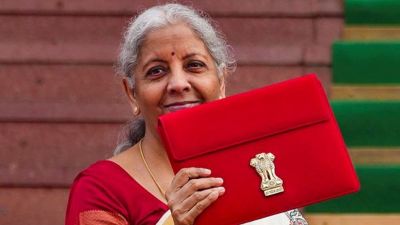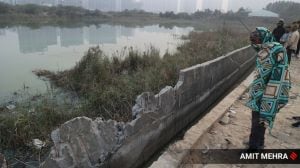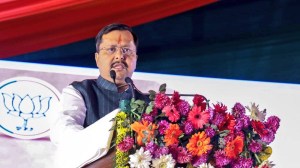Can This Man Stop Modi?
Barely a month ago, a riot-scarred Gujarat seemed to be in the BJP8217;s pocket. By naming an ex-RSS worker Shankersinh Vaghela as the new ...

Barely a month ago, a riot-scarred Gujarat seemed to be in the BJP8217;s pocket. By naming an ex-RSS worker Shankersinh Vaghela as the new state chief, the Congress hopes to take on chief minister Modi. reports on the changing equations
On the morning of February 28, when former Congress MP Ehsan Jafri cried for help with a mob gathered outside his Gulbarga Society house, no one , not even Congressmen, came to his rescue. Jafri was reportedly killed later that afternoon. Since then, the Congress party in Gujarat had gone into a coma. Ironically, with the election of Shankersinh Laxmansinh Vaghela, an ex-RSS man, as the Gujarat Pradesh Congress Committee GPCC chief, the Congress has risen as if from the grave. Galvanised from their stupor the Congressmen today are suddenly shouting: 8216;8216;Dekho, dekho kaun aaya, Narendra Modi ka baap aaya.8217;8217;
For the Bharatiya Janata Party he is a red rag in front of a raging bull. As soon as he stepped into the arena Gujarat Chief Minister Narendra Modi called for the dissolution of the assembly. 8216;8216;The Assembly was dissolved to give as little time to Vaghela as possible8230; If the polls are held in late September or early October, he will have had only two months. But for Vaghela, even this time is adequate,8217;8217; says one senior BJP leader, indicating all too well that the saffron party has hit the panic buttons over their one-time colleague now heading the Opposition.
While his detractors perceive him as a brazenly ambitious and overrated man, his admirers see him as a valuable asset. The truth is that party workers across the political divide are in awe of him. Ever since his youth, Vaghela has never let the different opinions about him bother him in the least. One day, while still in college, some miscreants decamped with his motorcycle. In hot pursuit, he traced the gang to a slum and managed to rescue his bike, but not before a scuffle.
Years later, as Gujarat Chief Minister in 1997, he ordered the arrest of Vishwa Hindu Parishad VHP leader Pravin Togadia after the latter, a la Bal Thackeray, announced that Gujarat would go up in flames if he was touched. 8216;8216;Vaghela ordered us to get Togadia anyhow within 24 hours. He scoffed at suggestions that there may be a law and order problem,8217;8217; recalled an official.
| Old foes Narendra Modi and Keshubhai Patel join hands |
Even as everyone watched in awe, Togadia was arrested. No incidents occurred. Later, Vaghela told one of his ministers, 8216;8216;What does Togadia think he is? Some kind of Bal Thackeray? It was necessary to bring down his pride, otherwise he would have terrorised the State.8217;8217;
His ability to resist challenges was probably influenced by his early training in the National Cadet Corps Rifles, from where he completed a 8216;C8217; certificate course to serve as under officer, and subsequently as a Class I warrant officer in the NCC.
Vaghela was the first to explode the myth of the BJP being a cadre-based disciplined party. His open revolt was spurred by the Modi-Keshubhai Patel duo, who nudged him into a corner. Vaghela struck back, taking 60 MLAs with him and flying off with all of them to Khajuraho. He took his revenge by pulling down the Keshubhai Patel Government, the first BJP regime in Gujarat, with 120 out of 182 seats.
A fighter almost to the point of being reckless, Vaghela has never bothered about consequences. On the day he got his expulsion letter from the BJP, he publicly tore it, cheered on by hundreds of his supporters. Angry with the BJP leadership for deciding to support the Modi-Patel duo, he launched his Rashtriya Janata Party RJP, announcing, 8216;8216;My high command will be the people of Gujarat.8217;8217;
But his confidence did him in. The RJP bombed, winning just four seats in the 1998 Assembly elections, while the BJP romped home. He was defeated for two reasons: first, Vaghela was perceived by the public as a highly ambitious and scheming person, few bought his claim to have been wronged; second, being a bi-polar state attempts to create a third force in Gujarat have always failed.
|
Vaghela8217;s Report Card
|
However, his brief stint as chief minister, with the backing of the Congress, is etched in public memory. The BJP Government later drafted one of its brightest ministers, Suresh Mehta, as the head of a committee to probe corruption charges against Vaghela. Not a single one could be proved. Vaghela also made attempts to cut the bureaucratic red-tape, taking quick decisions, and making it clear to the babus of officialdom that laws are to help people, not hold them up. Fulfilling age-old demands, he quickly created six new districts, thus achieving what the BJP and Congress governments could never do.
Initial protests from certain quarters later turned into praise. The staff in the Secretariat remember Vaghela for his campaign to grant jobs to the kin of deceased Class III and IV staff, who had hitherto been running from pillar to post. Deviating from tradition, he held Cabinet meetings in district headquarters and sorted out locals8217; problems on the spot. Modi hates him, but is imitating his model through his gram sabhas.
After his RJP8217;s humiliating defeat in the 8217;98 polls, it was a time of introspection for Vaghela. While others in his position would probably have retreated into a shell and gone into political oblivion, Vaghela wasted no time in making his way into the Congress, amidst widespread protests from the state PCC leaders who feared, and rightly so, that his charisma and spirit would dwarf them. They ensured that he remained caged within, not realising that no place was too small for him. The same man who could not ensure victory for the RJP was instrumental in winning for the Congress four of the six Lok Sabha seats in 1999.
It was chiefly his efforts which ensured that Modi faced a tough fight for the Rajkot-II seat, winning it with less than half the margin that the party had won in 1998. Hence, it was only a logical corollary that Vaghela would have to don the mantle of the State Congress president. But he has a hard battle ahead.
If Vaghela is aggressive, quick on the uptake and a master strategist, Modi is no less. Vaghela was already playing a stellar role in building the BJP before anyone had even heard of Modi. But Modi, after being ushered into the BJP from the RSS, didn8217;t get his rewards sitting idle. Both are hard workers and have incredible stamina.
Rhetoric apart, nobody can lay any bets on who8217;s going to emerge thewinner. But while Modi has not made the battle any harder for the Congress, a senior BJP leader admitted that 8216;8216;With Vaghela, the fight has become tough
for us.8217;8217;
After Vaghela paid obeisance at the martyrs8217; memorial in Khadia in Ahmedabad, a contingent of BJP workers cleansed it with milk. After Vaghela8217;s every statement, the BJP immediately issues a press release ridiculing him.
Today, given the polarisation within Gujarat, it is possible that the Hindutva card may far outweigh the Vaghela factor. But Vaghela has certainly electrified the once disillusioned Congressmen and become the biggest threat for the BJP.
| Hindutva ideology vs KHAM coalition |
|
BASHIR PATHAN, GANDHINAGAR For the BJP, the elections 8212; they could be held in September or October, depending on when the Election Commission gives its nod 8212; will be yet another opportunity to test its Hindutva card in the state it has always seen as a laboratory. Party leaders believe that the Godhra carnage and the violence that followed have consolidated the Hindu votes across the state for the BJP. The Congress will also be counting on the Muslims and backward class people, who turned up in large numbers to greet Vaghela when he was appointed GPCC president in Ahmedabad last week. Riot-battered Muslims in other parts of Gujarat, too, have hailed Vaghela8217;s appointment. Story continues below this ad The acute water and power shortage the farm community across Gujarat is facing may also come handy for Vaghela. Known for his aggressive campaigns, Vaghela has called a huge farmers8217; convention at Deesa in North Gujarat on August 4. It would surprise no one should the Congress leader blast the Modi government for ignoring the plight of peasants. Vaghela will also be touring south Gujarat and Saurashtra 8212; areas where the post-Godhra disturbances had little impact 8212; extensively in the near future. to expose the Modi government8217;s 8216;8216;failure on all fronts8217;8217;. In fact, barring certain pockets in urban centres, there seems to be no post-Godhra polarisation in other parts of the state, especially in rural Gujarat. To counter the ruling BJP8217;s Hindutva agenda, the new GPCC chief has promised the people of Gujarat a 8216;8216;riot-free8217;8217; state, with the opposition Congress already stressing on 8216;8216;peace and prosperity, progress and development8217;8217; as its poll plank. It remains to be seen whether the electorate responds to Modi8217;s agenda or to that of his arch political rival. |
- 01
- 02
- 03
- 04
- 05































